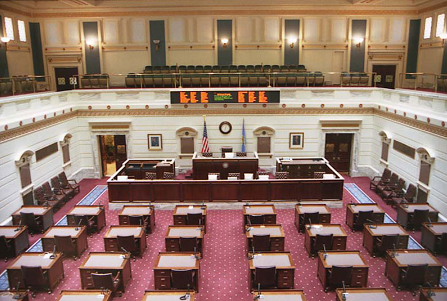
- Details
- By Chuck Hoskin Jr
Guest Opinion. We at the Cherokee Nation firmly believe in being good neighbors to all Oklahomans who share our home. The Oklahoma governor’s vetoes of the tribal-state compacts governing tobacco sales and motor vehicle registrations — both widely supported, bipartisan bills — were recently overturned by the Oklahoma State Senate.
That sends a clear message that collaboration with tribes is essential for the state and that the governor's choice of conflict over cooperation is isolated and not held by most elected leaders across the state. The veto override is a significant step forward in preserving the carefully negotiated agreements that have served both Oklahoma and tribes, like the Cherokee Nation, well for decades.
Tribal-state compacts are shining examples of successful collaboration in action. Over the years, they have benefited both Oklahoma and tribal nations alike, demonstrating the power of respectful partnerships. The Cherokee Nation is ready to continue working with all good-faith partners who share this same vision of collaboration.
I extend a heartfelt thanks to the senators and representatives who supported the veto override. Their understanding of the importance of these compacts reflects a real commitment to finding common ground and respecting tribal sovereignty. The uncertainty caused by these vetoes has had troubling implications for Oklahoma citizens and businesses. By finalizing the process, we can put an end to this uncertainty and ensure the stability that comes from honoring these compacts.

Our tribal jurisdictions and sovereignty have been upheld by the highest court in the land — the U.S. Supreme Court — as well as numerous other federal and state courts. We will always defend these rights, as they have been at the heart of our government and people since time immemorial. Despite this commitment to protecting our inherent rights, Cherokee Nation, along with other tribal governments in Oklahoma, remains optimistic we will continue to find mutually beneficial solutions and leaders who value and respect our status as sovereign nations.
As we move forward, let us embrace the spirit of collaboration and seek win-win outcomes that promote the well-being of all Oklahomans. Compacts are mutually beneficial, as they address shared challenges, promote economic development, and improve the well-being of both Cherokee Nation citizens and our neighboring communities.
The recent vetoes are simply the latest hostile action by Governor Kevin Stitt, who has shown an unwillingness to work with tribes on any issue. He does not support tribal-state compacts. His attempt to end our gaming compacts did tremendous and lasting damage to our relations and killed discussions that may otherwise have been productive. He also allowed tribal hunting and fishing compacts to expire, which ended a revenue stream that netted Oklahoma more than $35 million between 2016 to 2021.
Saving the motor vehicle compact preserves a highly successful program and prevents many Oklahomans, who drive with tribal car tags, from being put into a legal limbo over their vehicle registration. As part of Cherokee Nation’s agreement, the tribe contributes 38% of car tag revenues directly to Oklahoma public schools. School districts within and adjacent to the Cherokee Nation Reservation can use those dollars as needed for the benefit of all students. This year’s contribution was $7.8 million, and the tribe has given more than $84 million since 2002. Other car tag revenues support roads and bridges and law enforcement on the Cherokee Reservation, which benefit all Oklahomans who live and travel here.
Governor Stitt seems to live in a world in which any exercise of tribal sovereignty always comes at someone else’s expense. That is a world of Stitt’s own creation, and its phony. I see things quite differently, as do a growing array of civic, business and community leaders across the state. The rest of us see a world in which tribal sovereignty, including as expressed through tribal-state compacts, can benefit everyone.
As Principal Chief, I will always stress the significance of our tribal sovereignty. It is the foundation of our tribal nation. And I will always stand up to any person or organization that threatens our rights. However, I know that together, in the spirit of Gadugi — all of us working together for the greater good — we can build a stronger, more prosperous Oklahoma that celebrates and respects all its residents.
Chuck Hoskin, Jr. is the principal chief of the Cherokee Nation.
More Stories Like This
The SAVE America Act Threatens Native Voting Rights — We Must Fight BackThe Presidential Election of 1789
Cherokee Nation: Telling the Full Story During Black History Month
Jesse Jackson Changed Politics for the Better
Native News Online at 15: Humble Beginnings, Unwavering Mission
Help us defend tribal sovereignty.
At Native News Online, our mission is rooted in telling the stories that strengthen sovereignty and uplift Indigenous voices — not just at year’s end, but every single day.
Because of your generosity last year, we were able to keep our reporters on the ground in tribal communities, at national gatherings and in the halls of Congress — covering the issues that matter most to Indian Country: sovereignty, culture, education, health and economic opportunity.
That support sustained us through a tough year in 2025. Now, as we look to the year ahead, we need your help right now to ensure warrior journalism remains strong — reporting that defends tribal sovereignty, amplifies Native truth, and holds power accountable.
 The stakes couldn't be higher. Your support keeps Native voices heard, Native stories told and Native sovereignty defended.
The stakes couldn't be higher. Your support keeps Native voices heard, Native stories told and Native sovereignty defended.
Stand with Warrior Journalism today.
Levi Rickert (Potawatomi), Editor & Publisher

